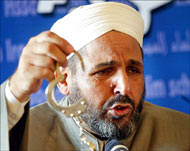Iraqi Sunnis seek more representation
Iraqi Sunni leaders have called for almost double the number of places offered to them on the committee tasked with drawing up the country’s permanent constitution.

Adnan Dulaimi, presiding over a meeting of 150 Sunni leaders to decide on which Sunni Arabs would help write the constitution, said on Wednesday: “Our representative must not number less than 25.”
On Sunday the 55-member parliamentary committee said it had 13 places for unelected Sunnis.
“Tomorrow (Thursday) we will propose 40 names from which we would like to see 25 selected and in case of disagreement we will propose a compromise,” Dulaimi said.
“If (our list) is blocked, we will suspend our participation.”
Dulaimi, leader of the Sunni waqf (religious endowments) agency, earlier laid out the principles he said should be enshrined in the constitution, due to be drawn up by 15 August.
These should include “the unity of the Iraqi people and the country’s territorial integrity, and Iraq belonging to the Arab nation”.
“Islam must be the state religion and the constitution must not include anything that goes against Islam,” he said. It should also “enshrine equal rights for religious and ethnic minorities and mechanisms to protect them”.
The meeting was held under the banner of “Sunni participation in the constitution” but without the country’s leading Sunni group, the Association of Muslim Scholars (AMS), which continues to boycott the political process while foreign troops remain in the country.
Delay demanded
Meanwhile the International Crisis Group (ICG) said on Wednesday Iraq should delay drafting its constitution to ensure that the document has the support of all the country’s groups.
|
“Iraqis face a dilemma: rush the constitutional process and meet the current deadline of August 15 … or encourage a process that is inclusive, transparent and participatory in an effort to increase popular buy-in of the final product” |
“Iraqis face a dilemma: Rush the constitutional process and meet the current deadline of 15 August… or encourage a process that is inclusive, transparent and participatory in an effort to increase popular buy-in of the final product,” the ICG said in a report.
Iraq‘s new constitution is due to be put to a referendum by 15 October, ahead of elections to choose a fully-mandated government by 15 December.
However, the Transitional Administrative Law under which Iraq is currently run allows for a one-off six-month delay to be announced by 1 August.
Constitutions drawn up over the past 10 years have taken between seven months in East Timor and four years in Ukraine, said the Brussels-based ICG.
But following delays in forming a government after January’s elections and in finalising the composition of the constitution-drafting committee, “an extremely tight timetable has been further reduced to three months”.
The ICG said its main concern was drawing the population at large into the drafting process.
Deadline pressure
American, British and UN officials have repeatedly called for the process to stick to its original timetable, and the ICG said Iraqi leaders may hesitate to delay the process because of that pressure.
 |
|
The meeting was held without the |
“There is an inherent contradiction in the international call for a constitutional process that is inclusive, participatory and transparent and insistence on the 15 August deadline,” the ICG said.
“Not only to secure a ‘yes’ vote in the referendum but also to forge a national consensus and thereby marshal support for the new political order as a whole.”
The ICG report said without broad consultation, many Iraqis will think the constitution “is of foreign authorship”. It added that the transitional law appeared to have been “pulled out of a hat” and signed in March 2004 “without even the merest hint of public input”.
“To negotiate a new social contract in a deeply traumatised and fractured society within less than seven months is hard enough; to do so in one-third that time is virtually impossible,” the report said.